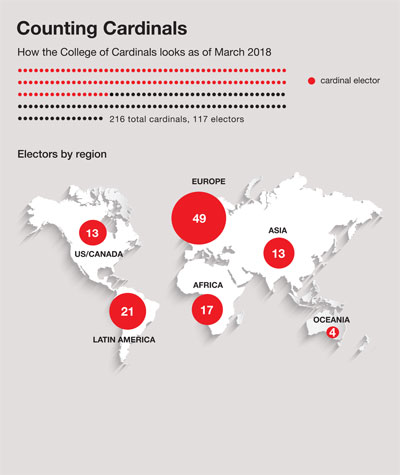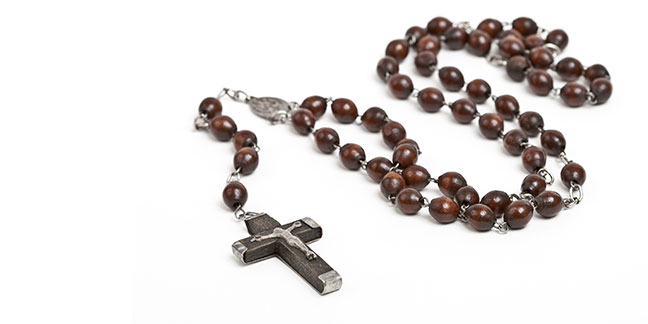 A cardinal is a senior ecclesiastic leader in the Roman Catholic Church. Cardinals, men who are chosen by the pope, have been involved in universal Church governance since the 13th century when the pope began consulting them on spiritual and temporal issues.
A cardinal is a senior ecclesiastic leader in the Roman Catholic Church. Cardinals, men who are chosen by the pope, have been involved in universal Church governance since the 13th century when the pope began consulting them on spiritual and temporal issues.
The term “cardinal” comes from the Latin word “cardinalis,” from the word “cardo,” or “hinge.” According to Church law, they should be “especially outstanding in doctrine, morals, piety and prudence in action” (Canon 351). Interestingly, they do not have to be bishops before becoming cardinals; they just have to be ordained at least to the priesthood, and once the pope chooses them they receive episcopal consecration. They “are obliged to cooperate assiduously” with the pope (Canon 356). If they are not diocesan bishops, they must live in Rome.
The collection of cardinals is called the College of Cardinals, and their principal function is the election of a new pope.
The term “Prince of the Church” regarding cardinals is a historical reference to those who held the equivalent role of a royal prince and in a feudal times ruled a principality. While certain cardinals hold on to this concept of prince in dress and behaviors, Pope Francis has stated that his newly appointed cardinals are not to be called “princes of the church,” but they are to serve the people of God and tackle the sins of the world. At one meeting Pope Francis “blasted” top cardinals for being “lustful of power, living hypocritical lives, suffering from spiritual Alzheimer’s instead of being men of God.” Pope Francis is trying to build a Church that emphasizes inclusion and mercy, focusing on serving the poor and marginalized peoples.
The pope announces new cardinals in a secret consistory – that is, a formal gathering of the College of Cardinals chaired by the pope. Ordinary consistories deal with serious or secret matters. Extraordinary consistories are called when there is a special pastoral, organization or governmental need of the Church.
Currently there are 216 members of the College of Cardinals, 117 of them under the age of 80 and eligible to vote in a conclave to elect a new pope.
While the number of cardinals has varied over the centuries, the number nearly doubled in the late 20th century. Pope Francis has appointed about one-third of the cardinals eligible to choose the next pope. Until recently, Europeans dominated the College of Cardinals. Pope Francis expanded the effort to diversify the College to reflect the Church’s global reach. He appointed cardinals from Asia, Africa and Latin America, and from countries that never had a cardinal, including Bangladesh, Lesotho and Malaysia.
Cardinals do not always share the views of the pope who appointed them. Some of their personal priorities differ from that of the pope, and they do not hesitate to publicly take issue with the pope. Such can be more than confusing to people.
Five years ago Pope Francis appointed nine cardinals to advise him on the reform of Church government, particularly the Roman Curia. This international Council of Cardinals, often referred to as the C9, met most recently with Pope Francis in late February. They have made many recommendations, recently proposing that the Congregations be more internationally staffed by a larger number of qualified laymen, women and young people and fewer priests.
Mercy Sister Jeanne-Margaret McNally is an authority on canon law and frequent lecturer at universities and dioceses. A graduate of The Catholic University of America with multiple degrees including a doctorate in psychology and a licentiate of canon law (JCL), she is a psychologist for the Tribunal of the Diocese of Charlotte and a judge in the Metropolitan Tribunal of the Archdiocese of Miami.
 The Rosary for Peace was first published by the U.S. Conference of Catholic Bishops following the attacks on 9/11. Pope Francis has called on all Catholics to pray for peace for Ukraine:
The Rosary for Peace was first published by the U.S. Conference of Catholic Bishops following the attacks on 9/11. Pope Francis has called on all Catholics to pray for peace for Ukraine:
SORROWFUL MYSTERIES
The First Decade: Meditate on the Mystery of the Agony in the Garden
Our Father...
“My heart is nearly broken with sorrow; stay here and keep watch with me.” (Monday of Holy Week, Morning Prayer, Antiphon I)
Hail Mary...
“Help us to bear witness by following Christ’s example of suffering.” (Passion Sunday, Evening Prayer I, Prayer)
Hail Mary...
“Here I am, Lord God, I come to do your will.” (Psalm 40:7-8) (Passion Sunday, Office of Readings, Responsory)
Hail Mary...
“You have redeemed us with your precious blood; hear the prayer of your servants and come to our help.” (Monday of Holy Week, Office of Readings, Responsory)
Hail Mary...
“My soul is in anguish, my heart is in torment.” (Good Friday, Evening Prayer, Antiphon 2)
Hail Mary...
“Father, if this cup may not pass, but I must drink it, then your will be done.”(Matthew 26:42) (Passion Sunday, Communion Rite)
Hail Mary...
“Through her heart, his sorrow sharing/ All his bitter anguish bearing.” (Our Lady of Sorrows, Sequence)
Hail Mary...
“Be glad to share in the sufferings of Christ! When he comes in glory, you will be filled with joy.” (1 Peter 4:13) (Our Lady of Sorrows, Communion Antiphon)
Hail Mary...
“Grant that we may bring love and comfort to our brothers and sisters in distress.” (The Blessed Virgin Mary at the Foot of the Cross I, Collect)
Hail Mary...
“For the sake of you, who left a garden, I was betrayed in a garden.” (Holy Saturday, Office of Readings, from an ancient homily on Holy Saturday)
Hail Mary...
Glory be...
The Second Decade: Meditate on the Mystery of the Scourging at the Pillar
Our Father...
“Now you come to scourge me and lead me to the cross.” (Passion Sunday, Evening Prayer I, Antiphon I)
Hail Mary...
“Christ was scourged and treated with contempt, but God’s right hand has raised him up.” (Passion Sunday, Evening Prayer II, Antiphon I)
Hail Mary...
“On my back see the marks of the scourging I endured to remove the burden of sin that weighs upon your back.” (Holy Saturday, Office of Readings, From an ancient homily on Holy Saturday)
Hail Mary...
“Bruised, derided, cursed, defiled,/ she beheld her tender Child,/ all with bloody scourges rent.” (Our Lady of Sorrows, Sequence)
Hail Mary...
“Though he was sinless, he suffered willingly for sinners.” (Passion Sunday, Preface)
Hail Mary...
“He offered himself as a victim for our deliverance.” (Holy Eucharist, Preface I)
Hail Mary...
“By your own blood, Lord, you brought us back to God.” (Passion Sunday, Morning Prayer, Responsory)
Hail Mary...
“The Father of mercies has given us an example of unselfish love in the sufferings of his only Son.” (Passion Sunday, Prayer of the People)
Hail Mary...
“He humbled himself for our sakes; may you follow his example.” (Passion Sunday, Prayer of the People)
Hail Mary...
“I fill out in my flesh what is lacking in the sufferings of Christ, for the sake of his Body, which is the Church.” (The Blessed Virgin Mary at the Foot of the Cross I, Communion Antiphon)
Hail Mary...
Glory be...
The Third Decade: Meditate on the Mystery of the Crowning with Thorns
Our Father...
“The head that once was crown’d with thorns/ Is crown’d with glory now.” (Exaltation of the Holy Cross, Office of Readings, Hymn)
Hail Mary...
“Christ is the King of all creation.” (Christ the King, Prayer after Communion)
Hail Mary...
“Have mercy on us for whose sake you endured so much.” (Monday of Holy Week, Office of Readings, Responsory)
Hail Mary...
“You will rule over all.” (Christ the King, Evening Prayer I, Responsory)
Hail Mary...
“You choose the weak and make them strong in bearing witness to you.” (Preface of Martyrs)
Hail Mary...
“You have entered on the way that the Lord has graciously opened up for you, until you receive the crown of glory.” (Common of Several Martyrs, Office of Readings, From a letter by St. Cyprian, bishop and martyr)
Hail Mary...
“I have kept the faith; now a crown of holiness awaits me.” (Common of One Martyr, Office of Readings, Responsory)
Hail Mary...
“By your own blood, Lord, you brought us back to God.” (Monday of Holy Week, Morning Prayer, Responsory)
Hail Mary...
“The Lord will bless his people with peace.” (Christ the King, Midmorning Prayer, Responsory)
Hail Mary...
“Come let us worship Jesus Christ, the King of Kings.” (Christ the King, Invitatory)
Hail Mary...
Glory be...
The Fourth Decade: Meditate on the Mystery of the Carrying of the Cross
Our Father...
“Jesus Christ accepted the cross and freed us from the power of the enemy.” (Wednesday of Holy Week, Collect)
Hail Mary...
“If anyone wishes to come after me, he must deny himself, take up his cross, and follow me.” (Common of One Martyr, Evening Prayer II, Antiphon 1)
Hail Mary...
“Through the cross you brought joy to the world.” (Good Friday, Song at the Veneration of the Cross)
Hail Mary...
“Lord, by the suffering of Christ your Son you have saved us all from death.” (Good Friday, Prayer)
Hail Mary...
“See the cross of the Lord; let all his enemies flee.” (Exaltation of the Holy Cross, Office of Readings, Antiphon 1)
Hail Mary...
“If we share fully in the sufferings of Christ, through Christ we shall know the fullness of his consolation.” (Common of One Martyr, Evening Prayer I, Antiphon 3)
Hail Mary...
“You suffered for us; have mercy on us.” (Exaltation of the Holy Cross, Evening Prayer II, Antiphon 2)
Hail Mary...
“Grant that by carrying our cross each day, we may come to share in his Resurrection.” (The Blessed Virgin Mary at the Foot of the Cross II, Prayer after Communion)
Hail Mary...
“Though innocent, he accepted death to save the guilty.” (Passion Sunday, Preface)
Hail Mary...
“Lord, through your cross bring us to the glory of your kingdom.” (Exaltation of the Holy Cross, Evening Prayer I, Intercessions)
Hail Mary...
Glory be...
The Fifth Decade: Meditate on the Mystery of the Crucifixion
Our Father...
“We must glory in the cross of our Lord Jesus Christ.” (Exaltation of the Holy Cross, Evening Prayer I, Antiphon 3)
Hail Mary...
“Christ our Savior, on the cross you embraced all time with your outstretched arms.” (Good Friday, Morning Prayer, Intercessions)
Hail Mary...
“O Christ, you humbled yourself and became obedient unto death, even death on a cross.” (Exaltation of the Holy Cross, Evening Prayer I, Intercessions)
Hail Mary...
“The death of your Son gives us hope and strengthens our faith.” (Passion Sunday, Prayer after Communion)
Hail Mary...
“We worship you, O Christ, and we praise you; because by your cross you have redeemed the world.” (Good Friday, Midmorning Prayer, Responsory)
Hail Mary...
“Father, into your hands, I commend my spirit.” (Handbook of Indulgences, Pious Invocation)
Hail Mary...
“Through his cross, Christ our peace has reconciled us to God.” (Our Lady of Sorrows, Evening Prayer, Antiphon I)
Hail Mary...
“At the cross with motherly love, she embraces her scattered children, reunited through the death of Christ.” (The Blessed Virgin Mary at the Foot of the Cross I, Preface)
Hail Mary...
“Raise us up to share in the triumph of your cross.” (Exaltation of the Holy Cross, Morning Prayer, Intercessions)
Hail Mary...
“Christ our life, by your death on the cross you destroyed the power of evil and death.” (Good Friday, Morning Prayer, Intercessions)
Hail Mary...
Glory be...
— Catholic News Service

